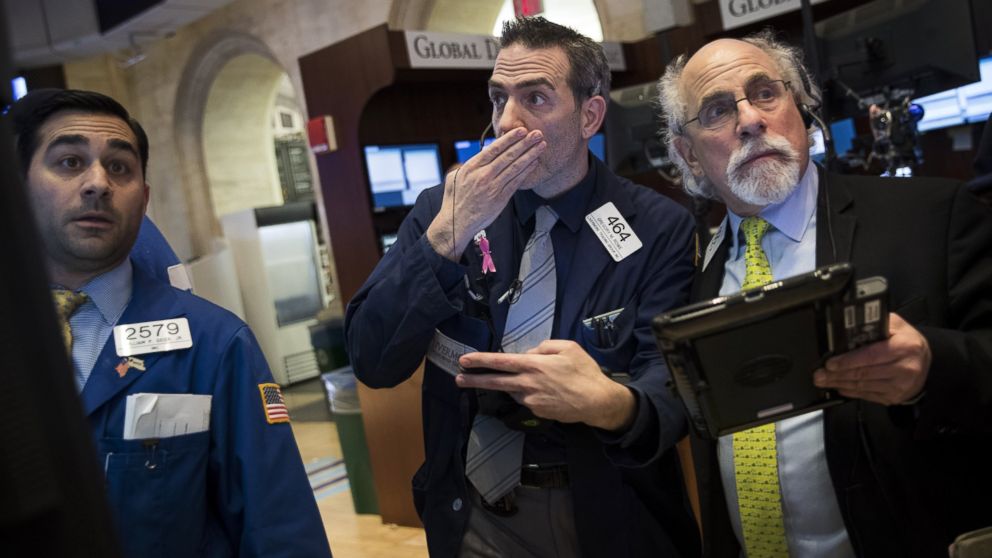The case for market pessimism versus optimism
One thing that could punish the markets: a potential trade war with China.

— -- The stock market this year has been a wild ride, ultimately hitting nosebleed heights. The Dow Jones Industrial Average posted 15 record closes between late January and mid-February.
When the Dow closing above 21,000 in late February, it matched its fastest 1,000-point ascent ever. This spring has been different, with a roughly 300 point decline from early March to early April. The pullback can be attributed to the growing investor skittishness over whether President Trump, beaten up by the failure of his health care bill, has the political capital to unite a splintered Congress to cut corporate taxes.
As this uncertainty has grown, some market observers have become increasingly pessimistic. They point to:
--Creeping pessimism about the market, namely the expectation among financial newsletter editors that stock prices will show an overall decline in the next six months.
--Concerns that bullishness (optimism) among newsletter writers, now at the highest level since 2004, must be at a peak and thus can only decline.
--Signs of pessimism among investment club members, based on some recent surveys.
--Some technical measures of volatility (the degree to which the market is going up and down), indicating a likelihood of mounting bearishness.
Citing these reasons, some expect a declining Dow. And looming in the background is the reality that we’ve gone 15 months without a market correction in the Dow, defined as a rapid decline of 10 percent to 20 percent. (A bear market is generally defined as a sustained decline of more than 20 percent.) Since World War II, corrections have occurred, on average, roughly every 20 months. Applying the logic of Isaac Newton, pessimists reason that a market that has been so high for so long is overdue to come down any day.
Yet the market’s capacity for long periods of suspension aloft is indecipherable, and there are strong opposing arguments. True, the market is overdue for a pullback — perhaps 5 percent or even more. But given this market’s resilient growth potential, this would be a pause that refreshes rather than destroys value. Pullbacks tend to be driven by emotion rather than any disparity between stock prices and underlying value. They give savvy investors an opportunity to capitalize on the actions of others who sell out of fear.
Selling in anticipation of a pullback and using highly mercurial and quirky technical readings tends to hurt long-term investors by setting them up for the doleful pattern of selling high, which ultimately benefits pros who then come in and buy low.
Moreover, various market and economic factors are cause for optimism that the bulls will continue to run:
--Upticks in personal wealth statistics and downticks in credit card debt reflect a potential increased capacity for individual investing.
--Consumer confidence is at its highest level since 2000, indicating sustained spending.
--Small-business optimism is at its highest level since 2004 — before even the embryonic period of the Great Recession.
--Significantly strong corporate earnings indicate sustained stock performance.
Energy prices are at a multi-month low -- a boon to American consumers looking to save at the pump and manufacturers hoping for lower production costs. Low energy prices pretty much help everyone except oil companies, dictators, kings and oligarchs.
Also positive are the Fed’s interest rate increases, which are likely to continue throughout the year. Such increases are often cited by financial media as auguring market declines, despite the undeniable historical record to the contrary. By and large, interest rate increases over the last 20 years have actually been good for the markets. Don’t ask me why some media outlets view these increases with dread. Sure, the average guy will have to pay more for a mortgage, but a better economy will help that guy make more money and compensates for a slightly higher mortgage payment.
Depending on where rates are at the time, the Fed is often inclined to raise them because of confidence in a strong or strengthening economy. That’s the case now, and this usually fosters market investment in general. This would suggest a sustained Dow.
These signs may hurt some stock market sectors, but they collectively bode well for others, including food and beverage, restaurants, airlines, travel/leisure, hotels, credit card issuers and entertainment/media.
The kind of economic growth in which the Fed evidently has confidence could also help health care companies, though there is a lot of uncertainty stemming from the failure of the "Trumpcare" bill. There are also widespread doubts about an effort to make it rise from the ashes in altered form and the eventual effects of Obamacare if Congress allows it to live well into 2017.
As long as the Fed doesn’t raise rates too fast, rising rates don’t usually pose a problem for investors.
One thing that could punish the markets is an issue that’s not receiving widespread attention: the potential for a trade war with China. That event could weaken the economy in ways that might not be good for the Dow.
To the extent that the market is currently buoyed by expectations of a corporate tax decrease, the decline in Trump’s political capital, reflected by his sagging approval rates, could also dampen the Dow.
As always, it’s unclear whether the pessimists or the optimists are right. But it’s important to remember that, while the market can be slowed or accelerated temporarily by passing events, it can still chug along nicely from good earnings alone.
Dave Sheaff Gilreath is a founding principal of Sheaff Brock Investment Advisors LLC. He has more than 30 years of experience in the financial services industry.
Any opinions expressed in this column are solely those of the author.